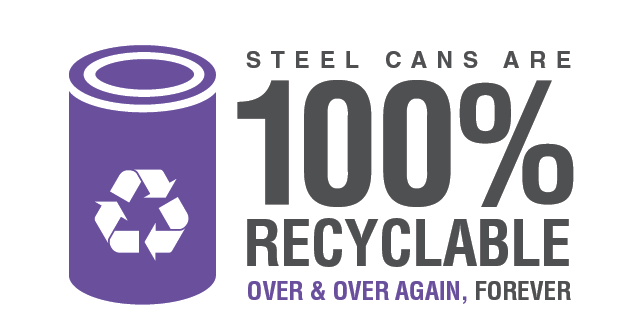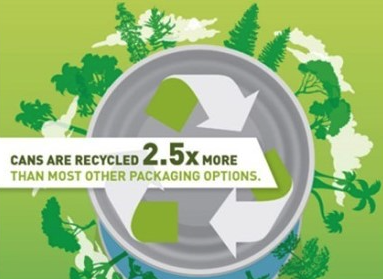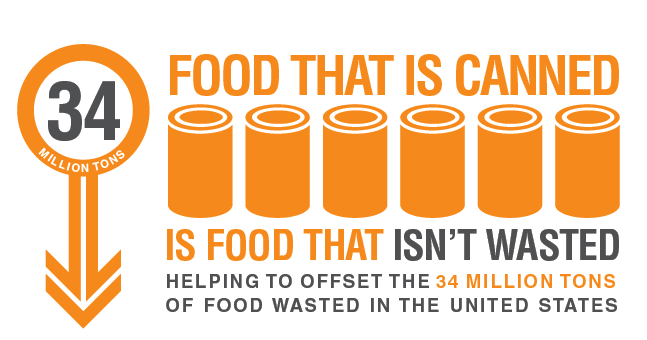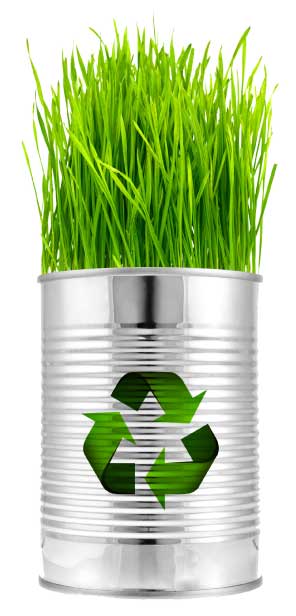Canned Foods – The Sustainable Choice
There are so many ways that cooking with canned foods can be better for you and our environment. The sustainable properties, health benefits, safety, and savings to your budget make canned foods a smart solution for better eating in today’s fast-paced world. The can seals in freshness, flavor and nutrition, enabling you to be confident about creating more, healthy meals while protecting the environment by recycling and throwing less away. Be good to yourself and the environment and chose foods packaged in cans.
Recycle cans forever!
Did you know that steel cans can be recycled over and over again? They are the most recycled food package in America today. Steel food cans are made almost totally of steel, which recycles forever. In contrast, other food containers can be made up of multiple materials or not accepted at curbside, making them hard to recycle and/or have significantly lower recycling rates. That makes them a great way to keep our planet healthier by keeping them out of landfills, reducing greenhouse gas emissions and saving energy. Keeping a pantry stocked with canned foods just makes good sense!
- EPA estimated the recycling rate for steel cans to be 71.3% (1.2 million tons) in 2018.
- The metal in food cans is 100% recyclable and recycles forever.
- Steel can be recycled again and again, forever, without loss of strength or quality, and easily recycled into a variety of steel products.
- Making a steel food can from recycled material involves 75% less greenhouse gas emissions.
- Every ton of recycled steel saves 2,500 pounds of iron ore, 1,000 pounds of coal and 40 pounds of limestone.

Waste less food.
Canned foods help Americans reduce the amount of perishable fruits and vegetables they purchase and then throw away. How you ask? Because fresh produce can spoil before we even get the chance to eat it, while keeping a well-stocked pantry of canned ingredients eliminates unnecessary spoilage and keeps food ready-to-eat without any need for cold storage.
Studies have shown that Americans throw away 50 percent of the fresh produce they buy every year. By reducing the amount of food we put in landfills and recycling metal cans, we can help reduce the impact on our environment. Plus, most recipes are designed to use a full can of food which eliminates food waste.
- Canned food retains quality and taste for more than two years, eliminating confusion and waste associated with “best by” or “use by” dates.
- The long shelf-life of canned foods helps Americans reduce the amount of fresh fruits and vegetables they purchase and then throw away each week.
- Nearly all registered dietitians agree that canned produce is a better value than fresh because it doesn’t spoil and is easy to store, which is important since Americans waste approximately 50 percent of fresh fruits and vegetables every year.
- Only around 16 percent of tomatoes and spinach, for example, are lost at the consumer level with canned versions, while 30-40 percent is lost with fresh.

Use Less Energy.
- Fruit and vegetables are harvested and canned within hours, which minimizes the impact on the environment.
- Canned produce goes from field to package within 4 ½ hours, whereas fresh produce takes 24 days from field to store.
- Shipping and storing canned fruits and vegetables, requires a much less energy-intensive cold chain distribution system than fresh and frozen.
- The process of cleaning, packaging, and sanitizing the produce uses low amounts of energy and water.
- The overall canning process saves energy, reduces food waste and helps seal in nutrients.

Visit https://www.cancentral.com/foodcans/environmentally-friendly to learn more about how steel food cans are environmentally-friendly and how canned foods curb food waste.

